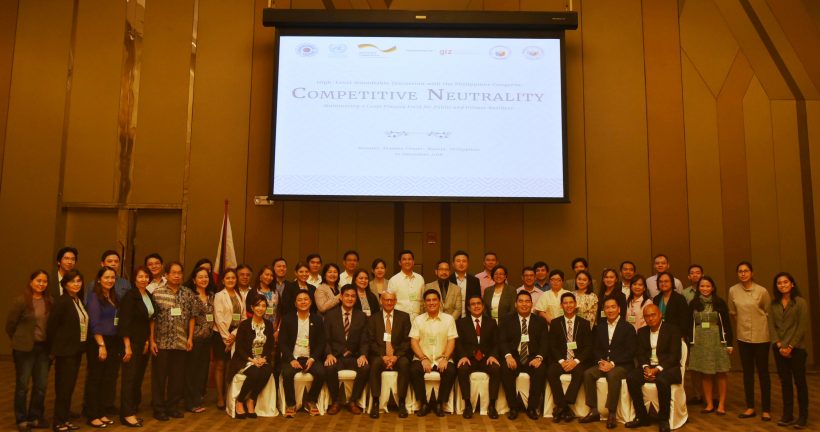Filter News
Latest News
PCC pushes for equal footing between private and public businesses

Recognizing that not all businesses are created equal, the Philippine Competition Commission (PCC) sets the tone in how to deal with private and public-owned businesses in the Philippines.
PCC held a two-day consultation with solons, officials from different partner agencies and international experts recently to promote “competitive neutrality” among different types of businesses.
Present during the event were Sen. Juan Miguel Zubiri, Chairman on the Senate Committee on Trade, Commerce and Entrepreneurship; Rep. Manuel Zubiri, Vice Chairman of the House on Representatives Committee on Trade and Industry; Rep. Dakila Carlo Cua, Chairman on the House of Representatives Committee on Ways and Means; and Rep. Joey Salceda, Vice Chairman on the House of Representatives Committee on Economic Affairs.
“This is a way for us to honor the mandate given to us by Congress and the significance of promoting the culture of competition in the country,” said Commissioner El Cid Butuyan.
The consultation on competitive neutrality recognizes fairness between private and public businesses despite how some state-owned enterprises (SOEs) are seen to have “undue advantage” over their private counterparts.
“Private businesses coexist with government businesses in a variety of markets. They do not always compete on equal terms,” said Pierre Horna, a competition expert and legal officer from United Nations Conference on Trade and Development (UNCTAD).
Horna said governments “historically” have the advantage in dealing with businesses but have been subjected to a level playing field when adhering to a host country’s competition law and policy.
He said some SOEs in different countries enjoy tax perks, have explicit or implicit government guarantees on debts, concessional interest rates on loans, free land use, effective immunity from bankruptcy, procurement priority, and other privileges as advantage not readily available to private companies.
Horna added that since Philippines established its competition authority only this year, there is a need to “survey the scope of state-owned enterprises, assess costs and benefits, test the public interest, compliance and complaints mechanism.”
For Director Johann Carlos Barcena of the Governance Commission on Government-Owned and -Controlled Corporations (GCG), competitive neutrality has been one of its guides in assessing the impacts of the government’s many SOEs, including whether an agency still serves its purpose.
From 2011 to 2016, Barcena said GCG has abolished 26 state corporations, financial institutions and GOCCs and 3 more has been set for privatization.
In the Philippines, PCC has initiated the National Competition Policy Review that maps the whole competition landscape in the Philippines and is expected to finish early next year.
In its preliminary assessment, the review panel has identified four (4) main types of modes where government engaged in businesses—government-owned monopolies, government-authorized private monopolies, government control of entry and expansion, and government provision of similar goods and services that directly or indirectly compete with the private sector.
Atty. Andre Palacios, review panelist and former PPP executive director of the Public-Private Partnership Center of the Philippines (PPP), explained that the team will recommend to either retain, recalibrate, remove or review several modes of government action.
The review panel is composed of Atty. Palacios; Dr. Raul Fabella, UP economics professor emeritus and the only national scientist for economics in the country; and Senen Bacani, former secretary of Department of Agriculture.
The review will be part of the chapter on competition policy in the Philippine Development Plan (PDP) 2017-2022. It is the first time for the PDP to include a chapter on competition. The PDP aims to foster a culture of competition, accelerate economic growth and encourage innovation.
